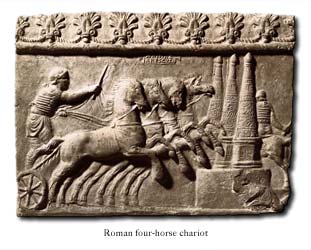


Chariots and Salvation: Homosexuality in the Late Roman Empire
Homosexuality was mostly permitted in the ancient world, but with the rise of Christianity life for those who preferred their own sex became difficult. In some cases, anti-gay measures were very unpopular, as shown when the Roman government imprisoned a beloved Greek chariot racer. Riots and massacres ensued.
About a half-century after Constantine, in AD 390, a celebrated chariot racer's penchant for other men would weaken the Roman Empire, humiliate the emperor, and strengthen the political power of the Catholic Church. The charioteer never meant to do anything other than win races, and his sexual tastes were not unusual. But the violent popular response to his imprisonment under one of Rome's first anti-homosexuality laws triggered a bloody chain reaction that ripped across the empire and resonated for centuries.
Male-male sex, long common in the ancient world, was repugnant to the Goth garrison policing the Greek city of Thessalonica, and especially to its commander, Butheric. The Christian-inspired law gave the soldiers the authority they needed to strike out against local practices. The exact charges made against the (supposedly) effeminate chariot racer are unclear. He might have been thrown in jail for something as mild as making a pass at Butheric's slave, or as grave as homosexual rape. Regardless, his absence left one hundred thousand spectators at the city's hippodrome without their favorite competitor. The crowd appealed to Butheric to let the charioteer participate in the games, but they were refused. Deprived of their hero, and nursing a deep hatred against the outnumbered Goth barbarians, the Thessalonicans then rampaged violently in the streets.
The mob mutilated Butheric and dragged his remains around the city. When news of the riot reached Emperor Theodosius in Italy, who then further learned that one of his favorite generals had been lynched, he flew into a rage and ordered savage retaliation. Just before the start of the next Thessalonican games, the reinforced garrison locked the hippodrome's gates and moved in to exact the emperor's revenge. The soldiers did not bother to distinguish who had been responsible for the riot from who had merely been there for a day's entertainment. As one Roman historian described it: "All together were cut down in the manner of corn in harvest time."